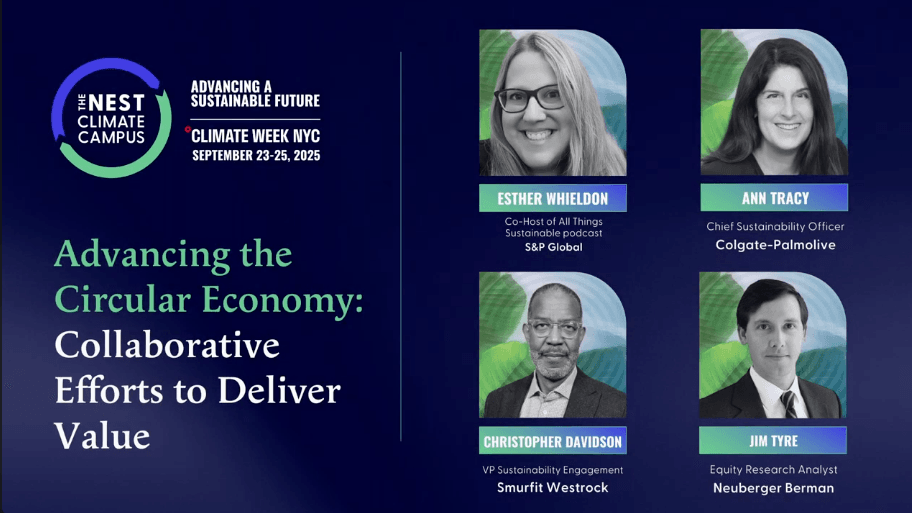Advancing the Circular Economy: Key Takeaways on Collaborative Partnerships from Nest Climate Campus at Climate Week 2025

This session, part of the Nest Climate Campus programming during Climate Week 2025, delves into how cross-industry collaborative partnerships are essential for driving momentum in the circular economy. The conversation—featuring perspectives from an investor, a global consumer brand, and a packaging supplier—explored how the “whole ecosystem” is responding to regulatory changes, consumer demands, and the need for shared value creation. ESG News is proud to feature this important discussion.
The Panelists: Leaders Across the Circular Ecosystem
This dynamic panel brought together a diverse group of experts to analyze circularity from multiple vantage points:
- Ann Tracy, Chief Sustainability Officer, Colgate-Palmolive
- Providing the perspective of a global consumer brand on threading the needle between sustainability, price, quality, and convenience.
- Christopher Davidson, Vice President, Sustainability Engagement, Smurfit Westrock
- Representing a packaging supplier whose whole business model is based on circularity—from forest to recycling.
- Jim Tyre, Equity Research Analyst, Neuberger Berman
- Sharing the critical lens of an investor analyst, focusing on financially material sustainability information and long-term risk.
- Esther Whieldon, Co-Host of the S&P Global All Things Sustainable podcast, S&P Global
- Moderating the discussion and guiding the exploration of shared value creation and collective action.
Driving Progress in the Circular Economy: 3 Core Themes
The conversation highlighted how systemic change requires alignment across supply chains, financial markets, and internal strategy, emphasizing that the journey is an “evolution not a revolution.”
1. Innovation Focused on Consumer Value and Carbon Savings
Colgate-Palmolive’s Ann Tracy emphasized the challenge of meeting consumer expectations—they want products to be more sustainable but will “not compromise on price, quality, or convenience.” To address this, the brand focuses on building sustainability in from the start and framing the benefit in terms consumers understand.
Examples of this approach included:
- Product Concentration: Taking water out of products (like home and personal care) results in huge carbon savings and less plastic use, while also offering customization to the consumer.
- Emulating Best Practices: Learning from campaigns like Proctor & Gamble’s Tide Cold Water, which focused on saving consumers $150 on their energy bill—a benefit more immediate and tangible than carbon savings.
2. The Power of Collaboration and Co-Developing Circular Solutions
The panelists showcased how deep, long-term partnerships are crucial for achieving difficult circularity targets. Smurfit Westrock’s Christopher Davidson noted that their 20+ year partnership with Colgate-Palmolive is built on trust and a willingness to co-develop solutions, such as:
- Recyclable Packaging Systems: Partnering to eliminate the non-recyclable PET layers in the cartons for Colgate’s new recyclable Total Toothpaste tubes, making the carton fully recyclable as well.
- Novel Applications: Providing the paperboard technology for the 16,000 “most sustainable” Olympic beds at the Paris 2024 games, which were recovered, recycled, and turned into wine boxes afterward.
- Material Recovery Innovation: At Smurfit Westrock’s Brazo mill in Italy, a $45 million investment in flotation technology led to a 75% reduction in landfill waste by recovering impurities like plastic for other producers.
3. The Investor Mandate for Financially Material ESG
Jim Tyre of Neuberger Berman brought the investor perspective, stressing that for sustainability issues to matter to a fund, they “got to be financially material to the health of the company.” The investment community is looking for:
- Long-Term Resilience: Companies that are innovating to de-risk their supply chains and future-proof their business model. Neuberger Berman notably voted against a shareholder proposal to walk back Colgate’s plastic reduction goals, recognizing the long-term risk of inaction.
- Partnership as a Competitive Advantage: In a traditionally “cutthroat, transactional business” like packaging, long-term, embedded partnerships that focus on innovation (e.g., plastic substitution and lightweighting) lead to more “profitable, symbiotic relationships” and fewer switching costs.
- Data and Accountability: Ann Tracy added that the sector is leaning into technology like AI-powered visual recognition for sorting centers (MRFs), where “data is king” to prove that new recyclable formats, like their tubes, are being properly recovered.
Session Conclusion: Continuing the Journey to Resilience
The session reinforced that while the public sphere may focus on the debate around ESG, companies like Colgate-Palmolive and Smurfit Westrock are “sticking to the program” and continuing to invest in sustainability. The collective action demonstrated by this panel serves as a potent example of how to connect sustainability efforts to long-term resilience and growth, making the case for why a continued evolution is non-negotiable for business health.
Explore more transformative discussions from the Nest Climate Campus by checking out our full series of Climate Week 2025 sessions on ESG News.
Special consideration to our Climate Week NYC 2025 partners: Novata, ESGCX, PATH Water, Novisto and The Nest Climate Campus








